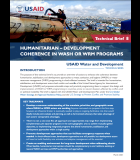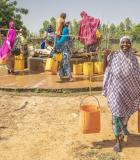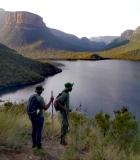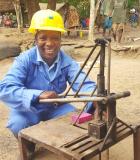Protect Wildlife (Protect)
The Protect Wildlife activity supports initiatives to align conservation policy with on-the-ground wildlife management actions and enforcement. The activity works in target landscapes to reduce threats to biodiversity, reduce poaching and use of illegally harvested wildlife and wildlife products, and improve ecosystem goods and services for human well-being.
Protect Wildlife’s principal counterpart is the DENR-Biodiversity Management Bureau (DENR-BMB) in coordination with the DENR-Forest Management Bureau (DENR-FMB), Department of Agriculture-Bureau of Fisheries and Aquatic Resources (DA-BFAR), the National Commission on Indigenous Peoples (NCIP), and various national level law enforcement agencies. At the local level, Protect Wildlife works directly with DENR Regional Offices; Provincial and Community Environment and Natural Resources Offices (PENROs and CENROs); and provincial, city and municipal local government units (LGUs), as well as local offices of DA-BFAR and NCIP. In Palawan, the activity coordinates with the Palawan Council for Sustainable Development Staff (PCSDS). At various levels, the activity works with non-government and civil society organizations (NGOs and CSOs); colleges and universities; and land and resource managers, such as ancestral domain and tenure holders and fisherfolk and coastal community organizations.
Activity Description
Protect Wildlife is a multi-pronged program that works to conserve biodiversity, protect wildlife, and sustain ecosystem services in ways that also improve the local population’s livelihoods and long-term well-being in the Philippines.
USAID/Philippines' Protect Wildlife initiative includes the following key activities:
- Coordinate between national and local agencies with misaligned priorities. Protect Wildlife works at the national, provincial, and local levels, collaborating with several national DENR bureaus to improve or develop policies or management plans on forestlands, watersheds, and protected areas, and strengthen enforcement mechanisms to combat wildlife trafficking. Simultaneously, the project works with local PENROs and CENROs to incorporate national policies and localize them into ordinances, land use plans, and development plans.
- Improve management of priority natural resources, such as watersheds and forests. The project works with policymakers at the national and local level to integrate several conservation-based landscape approaches to land use planning and ancestral domains, including social marketing, financial planning, enforcement, investments and adjudication in protected area management plans. Protect Wildlife organizes technical working groups and workshops that brings together multiple stakeholders to develop or create forest land use plans or comprehensive land use plans as well as protected area management plans that incorporate holistic conservation approach.
- Re-invest PES revenues as another source of conservation financing. Protect Wildlife supported four LGUs in establishing payment for ecosystem services (PES) schemes related to their waterworks systems. The PES of Brooke’s Point and Rizal are operational and have started to generate revenues. With increasing PES revenues collected by municipalities, Protect Wildlife assisted the LGUs to prepare a work and financial plan for the re-investment of PES revenues in rehabilitation and management of their critical watersheds. This will complement funding from the LGUs, private sector, NGOs, the DENR and other government agencies for agroforestry in production areas.
- Launch a BCC campaign for Brooke’s Point’s PES that is designed to inform water users about the PES concept and to instill pride in their participation in the rehabilitation and protection of their watershed. Water bills issued by the LGU have flyers on PES. A similar campaign is being planned for Rizal.
- Help lead Philippine universities to establish centers of excellence in conservation to produce research, support evidence-based policy making, and train next generation of conservation scientists.
Actual Outcomes
-
Assisted local governments in southern Palawan and in Zamboanga City to develop and operationalize governance schemes such as ring-fencing, business planning, and re-investment planning.
-
Supported Western Philippines University’s field research on sea cucumber growth and survival with the release of hatchery-produced juveniles into ocean nursery systems.
-
Developed a syllabus for environmental law and protection that universities may integrate into their criminology programs.
-
Facilitated advancement of one national and three local policy initiatives related to wildlife and environmental crime prevention and trained 368 government staff in combating wildlife and environmental crime.
-
By the end of 2018, the project has placed 372,912 hectares of biologically significant areas under improved natural resource management.






